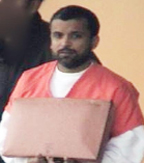Minister of Home Affairs Clement Rohee last evening said he could not comment on whether US drug accused Shaheed ‘Roger’ Khan purchased sophisticated telephonic surveillance equipment with permission from the Government as he was not in the security sector at that time. Rohee was Minister of Foreign Trade in the year 2002 when it was suspected that Khan bought the equipment.
Contacted last evening by Stabroek News to comment on a report in yesterday’s Sunday Stabroek where one of Khan’s lawyers claimed that he bought the equipment with government approval, the minister said that he had read the report but could not comment. He said he does not have specific details on the issue but stated that “obviously” more information would be sought by the government on it. Should the government be furnished with any additional information, Rohee said that it would then have to examine it to see how valid the claims are. He pointed out that the police have already established contact with US officials on matters surrounding Roger Khan.
Asked whether the issue would not have been discussed at Cabinet in 2002, the minister said that he would not disclose any information on what may or may not have been discussed at cabinet level.

In a subpoena to the US Drug Enforcement Administration, Khan’s lawyers stated: “FBI agent Justin Krider investigated Khan’s purchase of the computer telephonic surveillance equipment from the Spy Shop in Fort Lauderdale, Florida and found Khan had permission from the Government of Guyana to purchase and possess this equipment.”
Simels is seeking the testimony and all documents in Krider’s possession as these relate to the surveillance equipment purchased in Florida.
In a background paragraph, the subpoena says that Khan is alleged to have used the equipment to improperly wiretap various high-ranking officials and others within Guyana in order to maintain his “alleged drug organization.”
Khan became known when along with Haroon Yahya and policeman Sean Belfield he was detained on December 4, 2002 by an army patrol and turned over to the police following the discovery of the sophisticated electronic surveillance equipment and arms in a pick-up at Good Hope, East Coast Demerara.
At the time of their arrest they had told law enforcement officials that they were in search of Shawn Brown and the other prison escapees who had fled the Camp Street prison earlier that year. Khan and the two others were later charged with possession of arms and ammunition and placed on $500,000 bail each.
The charges were subsequently dismissed by the late Magistrate Jerrick Stephney at the Sparendaam Magistrate’s Court the following year.
Since their release there had been no public
information on what happened to the equipment and many questions posed to officials by this newspaper on how the equipment came into the country and what happened to it after the court case went unanswered.
At one time the army had said that it had turned over the equipment to the police but the police later seemed not to know of its whereabouts.
Reports had indicated that the laptop was capable of intercepting and tracing telephone calls made from a landline or a cellular phone and the software is reportedly only sold to governments. At the time, then Home Affairs Minister Ronald Gajraj said the use of the instrument did not breach any of the laws of Guyana.
Several months later a senior police officer, speaking anonymously, had said the police were advised to return the vehicle to the men, but that the weapons were unlicensed and were therefore being confiscated by the police along with the ammunition and equipment.
The vehicle that the trio was found with was equipped with bullet-proof windows and its body was also reinforced. Enquiries at the time with the Customs and Trade Administration and the police failed to elicit the identity of the person who imported the vehicle.
Insiders say it is believed that the surveillance equipment was passed back to Khan after the trial. Khan had later acknowledged that he had taped several conversations of leading security officials and other personalities. It is believed that the same equipment returned to him after the Good Hope trial was used in these recordings.
Prior to his arrest in Suriname and turning over to the US authorities, Khan had argued repeatedly that he had assisted the Guyana government in fighting crime and subversive elements. His pitch appeared to be an attempt to win public support to prevent his apprehension by the American authorities and also to have the government here acknowledge his role.
Observers say that the reference to the spy equipment in the court proceedings may be a signal to the government here that Khan intends to divulge more about what he claims he did to fight crime during the period after the 2002 jail-break.
The revelations by the US government in its court case against Khan have riveted local attention. A witness for the US is likely to testify when the trial starts that a phantom gang linked closely to Khan was responsible for around 200 killings. It has already been stated by the US in court documents that Khan was responsible for the murder of national cyclist, Devendra Persaud and boxing trainer Donald Allison. Khan has denied this in court proceedings.





